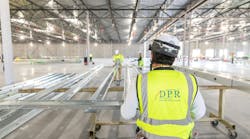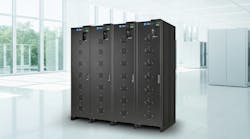Bankers: Higher Rates May Alter Timing and Terms, But Data Center Investment Will Continue
The combination of higher interest rates and the failure of Silicon Valley Bank may affect the timing and terms of capital flows for digital infrastructure, but are unlikely to reduce the growth of the data center sector, according to investors who spoke at last week's DCD Connect New York conference.
"In times like these, capital comes at a premium," said Jeff Ferry, a board member at Elea Digital, a data center platform in Brazil. "There's less liquidity and things may slow down. Your cost of capital and cost of borrowing has gone up."
But investment in data centers is likely to continue, according to Ferry and other bankers and investors.
"These funds have to invest, because they've raised money and they will chase growth," said Ferry. "(Return) multiples might be lower than they were, but they're still likely better than other real estate investment alternatives."
Some investors drew lessons from the sector's history during earlier periods of financial duress. Data centers performed well during the "great financial crisis" of 2008-10, when wholesale data center suites became popular, allowing companies to preserve capital by leasing space instead of building their own facilities.
"Each of these business cycles are very different, but illustrative of what we face today," said Jon Mauck, Senior Managing Director at DigitalBridge Investment Management. "The digital economy is not always correlated to the rest of the economy. One of the categories that's outperforming right now is data centers.
"I've never seen stronger growth," Mauck added. "The fundamentals are unbelievable. There's a ton of capital that wants to invest in data centers, and AI is going to be a significant driver of growth."
What Has Changed?
As we noted in our DCF 2023 Forecast, the data center sector is not immune to the business cycle, but is driven by broad shifts that support continued investment during economic dislocation. But although the demand environment remains strong, the new environment will bring change and challenges to some parts of the market.
"We're going to be in the higher interest rate environment for a while," said Joseph Junda , Managing Director for TMT at Capital One.
Valtin Gallani, an investment banker at Societe Generale, said the collapse of SVB has highlighted "duration risk" - the prospect that long-term bond holdings can lose value in a market where interest rates are rising.
"This topic of duration risk is interesting," said Gallani. "It is now front and center."
One area where there may be less activity is the use of asset-based financing (ABS), also known as securitization, a strategy that has helped companies like Vantage Data Centers, Aligned, Sabey Data Centers, EdgeConneX and STACK Infrastructure raise billions of dollars to fund data center development.
In an ABS/securitization financing, a company creates a security based on the creditworthiness of a specific pool of assets, rather than the entire company. Data center developers can issue debt notes backed by cash flow from stabilized, highly-leased data centers.
"ABS issuers are looking at all the options and trying to find the right window of opportunity," said Gallani. "That market will come back gradually.”
"We need the ABS market to function," said Junda, who said new issuers of debt might find the ABS market challenging in the next few months.
Kanan Joshi, a Senior Director for infrastructure fund DIF Capital Partners, said the new environment will cool down some of the pricing on acquisitions in the digital infrastructure sector, which have fetched attractive valuations in recent years.
"Yes, there will be an impact on multiples," said Joshi. "The business continues to be strong, which is why the capital markets can continue to be open. Some returns will get compressed by higher costs. The only folks who are coming to market now are those that need the capital."
Demand Still Strong, But More Diverse
A number of panelists acknowledged that some hyperscale operators have delayed or canceled some of their data center deployments, but said the concerns about cloud growth will likely prove to be overblown.
“Everybody's in reset mode," said Ferry. 'They pulled back on their commitments and are reassessing what the real growth looks like. They're slowing down growth rates, but it's really just pushing that growth out to the back end of '23 or into 2024 or 2025 The same demand will be there ultimately."
"The hyperscale data center thesis has been proven out and this business continues to grow," said Joshi. "We may see a pullback this year, but these businesses are very resilient."
Mauck also said that the data center priorities for many clients will shift to supporting workloads for artificial intelligence (AI).
"We're in an arms race right now," said Mauck. "What's going to be the game changer is when you commercialize all these AI technologies in applications. That's going to be disruptive."
Power Concerns Shape the Market
Power constraints in leading data center markets will continue to be a challenge, panelists said.
"With what happened in Northern Virginia with Dominion Energy, it has become very apparent that power is a scarce resource," said Gallani. "The biggest barrier to entry is power. That is really driving leasing and construction costs."
Power is no longer just an issue for Northern Virginia and Silicon Valley, according to Jonathan Schroth, a Research Analyst for Datacenter Infrastructure at 451 Research/S&P Global 451 Research
"Quebec has always been the jewel in the Canadian crown in terms of renewable power," said Schroth. "They've always had a surplus of supply, but that's changing. Hydro Quebec is looking at data center projects more carefully, and applying socio-economic criteria to data centers, as they did with cryptocurrency companies. That will mean a short list of favorite companies, just as with crypto."
The availability of renewable power has also boosted new sub-markets, Schroth said, such as Forest Grove in the Portland, Oregon market.
As we've recently noted here at DCF, the super-sizing of requirements also impacts site selection.
"It's very difficult to keep up with demand," said Karlton Holston, the Executive Vice President for Digital Infrastructure at Landmark Dividend. "People who used to ask for 4 to 8 megawatt requirements are now asking for 10 to 20 megawatts and they want the space in six months instead of 18 months."
"A lot of projects are completely pre-leased before the shovel hits the ground," said 451's Schroth. "It's incredible to see the level of demand. Data centers are more important than toilet paper."
About the Author




